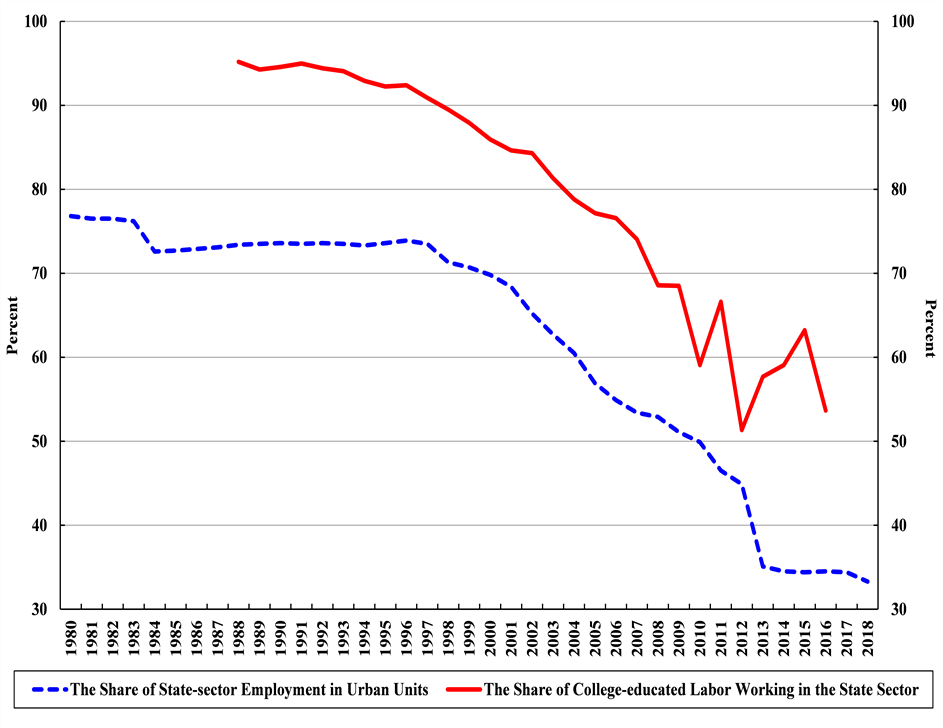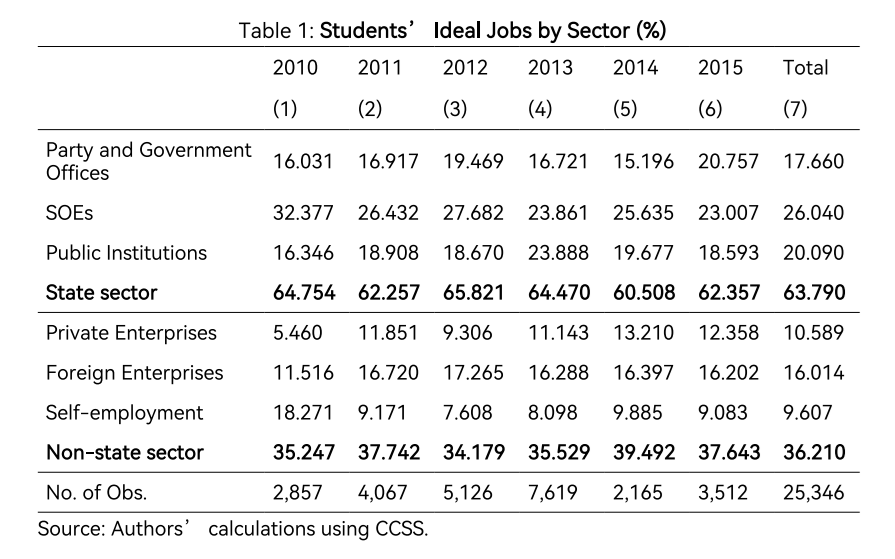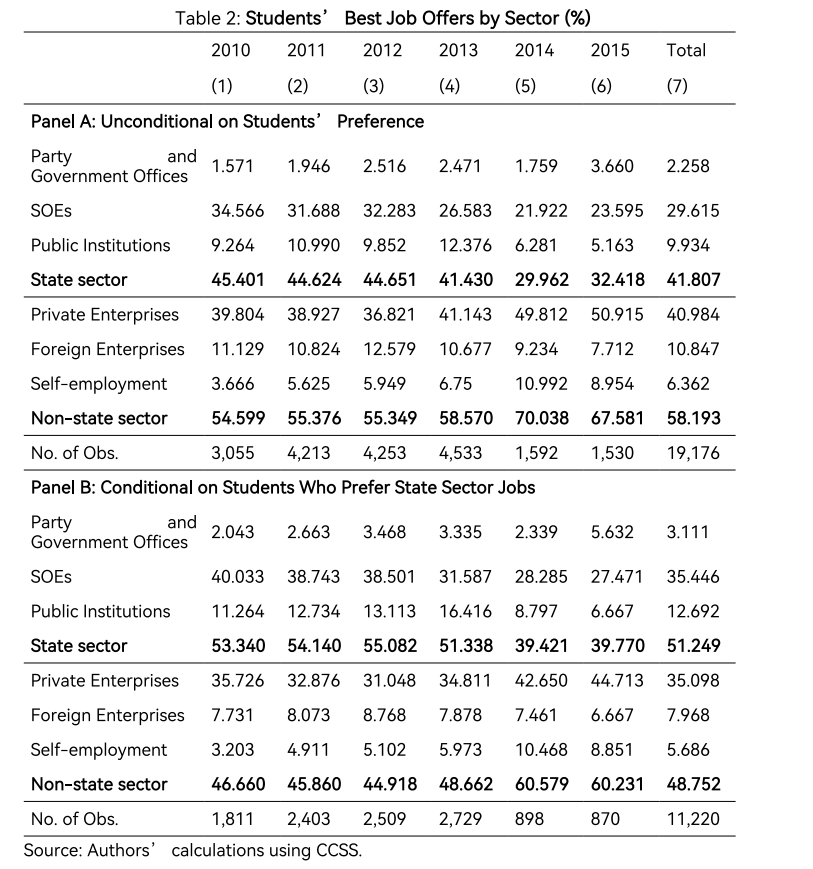Brain Drain to the State Sector: Job Preferences and Outcomes for China’s College Graduates
Despite private enterprises dominating China’s labor market, college-educated workers are still highly concentrated in the state sector. Using data from the Chinese College Student Survey, we find that 64% of students in the sample expressed a strong preference for state-sector employment. We also identify several factors associated with receiving job offers from the state sector, including being male, holding pre-college urban hukou status, being a member of the Chinese Communist Party, performing well on standardized tests, attending elite universities, and having higher household income or high-status parental backgrounds. These findings suggest that despite China’s economic transition, the private sector may still struggle to attract highly educated workers.

Over the past four decades, China’s labor market has undergone significant reforms that have led to a shift in employment from the state sector, i.e., the government and state-owned enterprises (SOEs), toward the nonstate sector. Prior to the reforms, the majority of urban workers were employed in the state sector. However, as shown in Figure 1, the proportion of urban employment in state-owned units drastically decreased from 76.8% in 1980 to 33.3% in 2018. Despite the significant shrinkage of the state sector in relation to the overall labor force, it continues to engage a substantial number of college-educated workers. As Figure 1 illustrates, until the late 1990s, college-educated workers were predominantly concentrated in the state sector. Even though this proportion has witnessed a dip in recent years, as of 2016, a hefty 53.7% of college-educated workers remained employed in the state sector. Consequently, we can anticipate a considerable state sector job market for college graduates to persist in the future, and it is important to examine who desires and secures these positions.
Figure 1: The Share of Employment in the State Sector

Source: Authors’ calculations using NBSC (2018), Urban Household Survey, 1988–2009, China Health and Nutrition Survey, 2006, 2009, 2011 and 2015, China Family Panel Studies, 2010, 2012, 2014 and 2016, and Chinese General Social Survey, 2008, 2010 and 2013.
Prior studies indicate that women, older people, certain political party affiliates, and those who are risk-averse tend to prefer public sector jobs (Lewis and Frank 2002, Pfeifer 2010). Yet, the role of education in shaping this preference remains unclear. Furthermore, the influence of parental occupation, particularly in the government sector, doesn’t appear to significantly impact an individual’s job choices (Lewis and Frank 2002). When it comes to determining who can secure employment in the public sector, an individual’s educational background is seen as a crucial factor. Candidates with college degrees, particularly in humanities and social sciences, are more likely to land public sector jobs (Gregory and Borland 1999). Demographics, too, play a significant role. Men, older individuals, and political party members seem to have an advantage in securing public sector jobs (Lewis and Frank 2002; Gao, Kong, and Kong 2017). Moreover, individuals with parents holding college degrees, those in managerial roles, and those employed in government positions tend to have a higher chance of securing public sector employment (Lewis and Frank 2002; Scoppa 2009; Gao, Kong, and Kong 2017).
However, due to the absence of appropriate data, there has been a limited systematic exploration into the preferred and ultimate employment sectors of highly educated workers, such as college graduates, in China. Moreover, previous studies have not concurrently distinguished between the factors that shape people’s preferences for state sector employment and those that affect their likelihood of securing a position in the state sector.
In our recent study (Li et al. 2023), we utilize a unique dataset, the Chinese College Student Survey (CCSS), which furnishes us with firsthand data to probe into new college graduates’ job preferences and outcomes. In this context, state sector jobs refer to positions in government offices, SOEs, and public institutions such as hospitals, schools, research institutes, and social welfare organizations. By focusing on new college graduates, we aim to capture the trends of the current Chinese labor market. The CCSS was conducted by the authors annually from 2010 to 2015 and involved 40,911 graduating students from 90 colleges. The survey collected information on students’ desired jobs, job search behaviors, and best job offers, as well as demographic data such as standardized test scores, activities in college, and family background. Additionally, it allowed us to distinguish between individuals seeking work and those who received job offers.
We consistently find that the state sector remains highly desirable to new college graduates in China, as evidenced by the fact that, on average, 63.8% of students in our sample hoped to secure employment in this sector (Table 1). This preference remains constant across various survey years and individual characteristics, including the impact of the 2012 anticorruption campaign and the decline in formal posts in administrative and public institutions. Our results further indicate that female students, Chinese Communist Party (CCP) members, and those with social connections to the state sector are more likely to express a desire to work in the state sector, while students with higher English proficiency and household income are more likely to prefer private sector employment. However, even among these subgroups, over 60% expressed a preference for state sector jobs.

We offer several possible explanations for why college students favor state jobs. We show that state sector employment may offer higher wages and benefits, greater job security, better working conditions, and greater prestige and control rights. On the demand side, government and SOE reforms may have led to an increased relative demand for college-educated workers.
We also demonstrate that the competition for state sector employment is fierce for students seeking such work. Despite the fact that the majority of students preferred state sector jobs, only 41.8% of students in our sample received job offers from state sector institutions. Furthermore, of the students who desired employment in the state sector, only half (51%) received job offers from state sector employers (Table 2). Our analysis indicates that male students, those with pre-college urban hukou, graduates of elite universities, CCP members, students with strong standardized test scores, those from higher-income households, and students with college-educated or party cadre parents, as well as those with social connections to the state sector, were more likely to secure employment in the state sector.

Our findings suggest that the state sector may perpetuate intergenerational and intragenerational inequality. Males and well-connected students had an advantage in landing state sector jobs over females and less privileged students. Children of cadres and those with relatives in the state sector also had greater success in job placement. Additionally, a smaller proportion of female students received state jobs, suggesting a potential hiring bias against them. Eliminating identity, social status, and gender biases in state sector recruitment may reduce inequality.
Our study carries significant implications for China’s future economic development. The persistent preference for state sector jobs among college-educated individuals, despite the growth of the private sector and the decline of SOEs, raises concerns about the private sector’s ability to attract top talent. This talent shortage could hinder the future growth and competitiveness of the private sector. Conversely, the government and SOEs may have an advantage in attracting and retaining high-quality human capital, which could help improve their management and organizational capabilities, further strengthening their dominant position in the labor market and the overall economy.
Our findings highlight a potential brain drain toward the state sector in China, and given the evidence of lower efficiency in SOEs compared to private firms, there is a risk of diminished economic efficiency when the best human capital is concentrated in the state sector.
(Hongbin Li, Stanford University; Lingsheng Meng, Stanford University; Yanyan Xiong, Zhejiang University; Sinclair Cook, Columbia Law School.)
References
Gao, Jie, Dongmin Kong, and Gaowen Kong. 2017. “Who Secures Job Opportunities in the Chinese Government? Evidence Based on the First Jobs of Graduates from a Chinese College.” Pacific Economic Review 24 (3): 447–63. https://doi.org/10.1111/1468-0106.12216.
Gregory, Robert G., and Jeff Borland. 1999. “Recent Developments in Public Sector Labour Markets.” In Handbook of Labour Economics, vol. 3, part C, edited by Orley C. Ashenfelter and David Card, 3573–3630. https://www.sciencedirect.com/handbook/handbook-of-labor-economics/vol/3/part/PC.
Lewis, Gregory B., and Sue A. Frank. 2002. “Who Wants to Work for the Government?” Public Administration Review 62 (4): 395–404. https://doi.org/10.1111/0033-3352.00193.
Li, Hongbin, Lingsheng Meng, Yanyan Xiong, and Sinclair L. Cook. 2023. “Job Preferences and Outcomes for China’s College Graduates.” China Quarterly (November): 1–19. https://doi.org/10.1017/S0305741023001510.
National Bureau of Statistics of China (NBSC). 2018. China Statistical Abstract. Beijing: China Statistics Press.
Pfeifer, Christian. 2010. “Risk Aversion and Sorting into Public Sector Employment.” German Economic Review 12 (1): 85–99. https://doi.org/10.1111/j.1468-0475.2010.00505.x.
Scoppa, Vincenzo. 2009. “Intergenerational Transfers of Public Sector Jobs: A Shred of Evidence on Nepotism.” Public Choice 141: 167–88. https://doi.org/10.1007/s11127-009-9444-9.

Latest
Most Popular
- VoxChina Covid-19 Forum (Second Edition): China’s Post-Lockdown Economic Recovery VoxChina, Apr 18, 2020
- China’s Great Housing Boom Kaiji Chen, Yi Wen, Oct 11, 2017
- China’s Joint Venture Policy and the International Transfer of Technology Kun Jiang, Wolfgang Keller, Larry D. Qiu, William Ridley, Feb 06, 2019
- The Dark Side of the Chinese Fiscal Stimulus: Evidence from Local Government Debt Yi Huang, Marco Pagano, Ugo Panizza, Jun 28, 2017
- Wealth Redistribution in the Chinese Stock Market: the Role of Bubbles and Crashes Li An, Jiangze Bian, Dong Lou, Donghui Shi, Jul 01, 2020
- What Is Special about China’s Housing Boom? Edward L. Glaeser, Wei Huang, Yueran Ma, Andrei Shleifer, Jun 20, 2017
- Privatization and Productivity in China Yuyu Chen, Mitsuru Igami, Masayuki Sawada, Mo Xiao, Jan 31, 2018
- Evaluating Risk across Chinese Housing Markets Yongheng Deng, Joseph Gyourko, Jing Wu, Aug 02, 2017
- How did China Move Up the Global Value Chains? Hiau Looi Kee, Heiwai Tang, Aug 30, 2017
- China’s Shadow Banking Sector: Wealth Management Products and Issuing Banks Viral V. Acharya, Jun Qian, Zhishu Yang, Aug 09, 2017




 Facebook
Facebook  Twitter
Twitter  Instagram
Instagram WeChat
WeChat  Email
Email 


